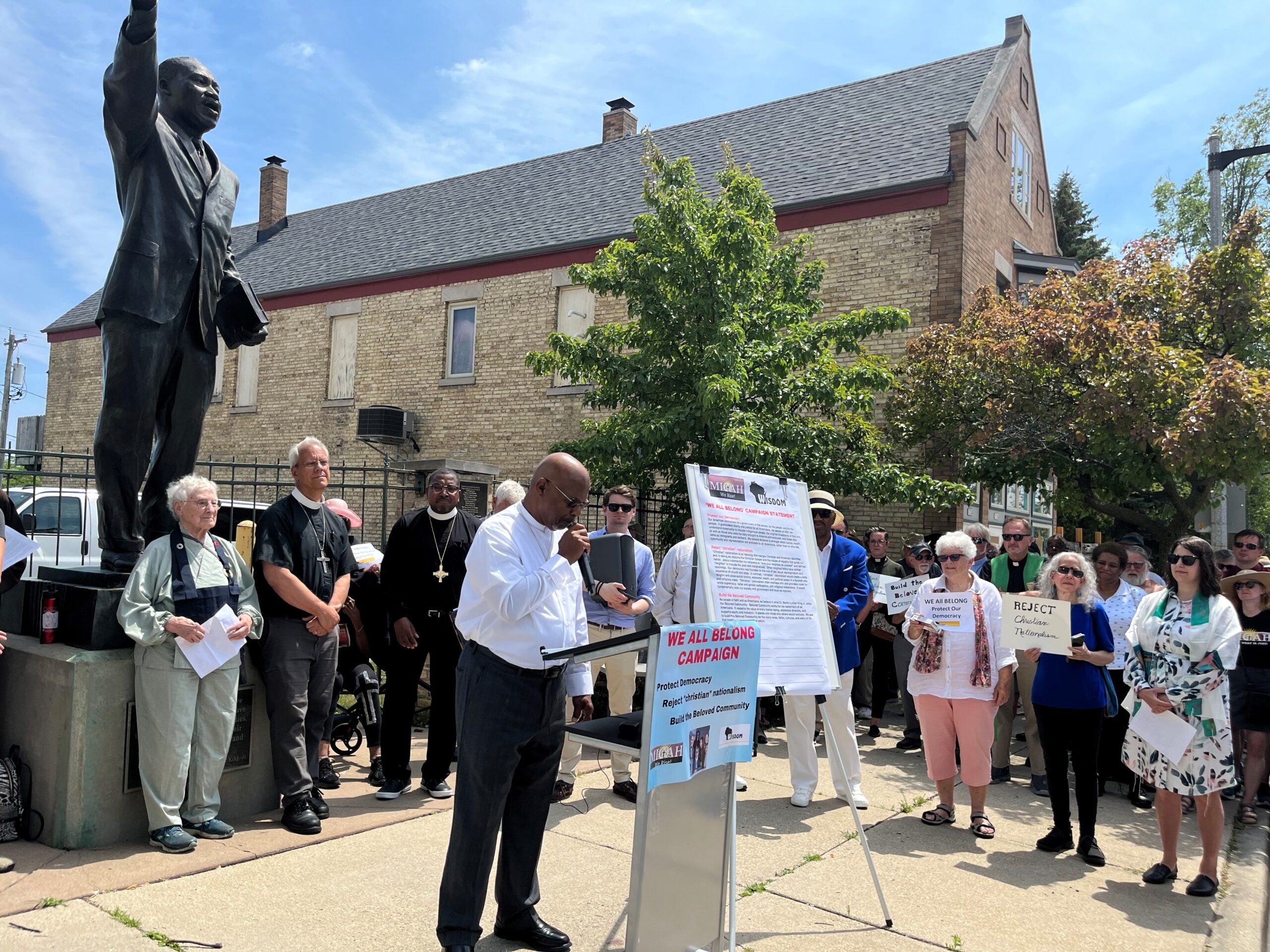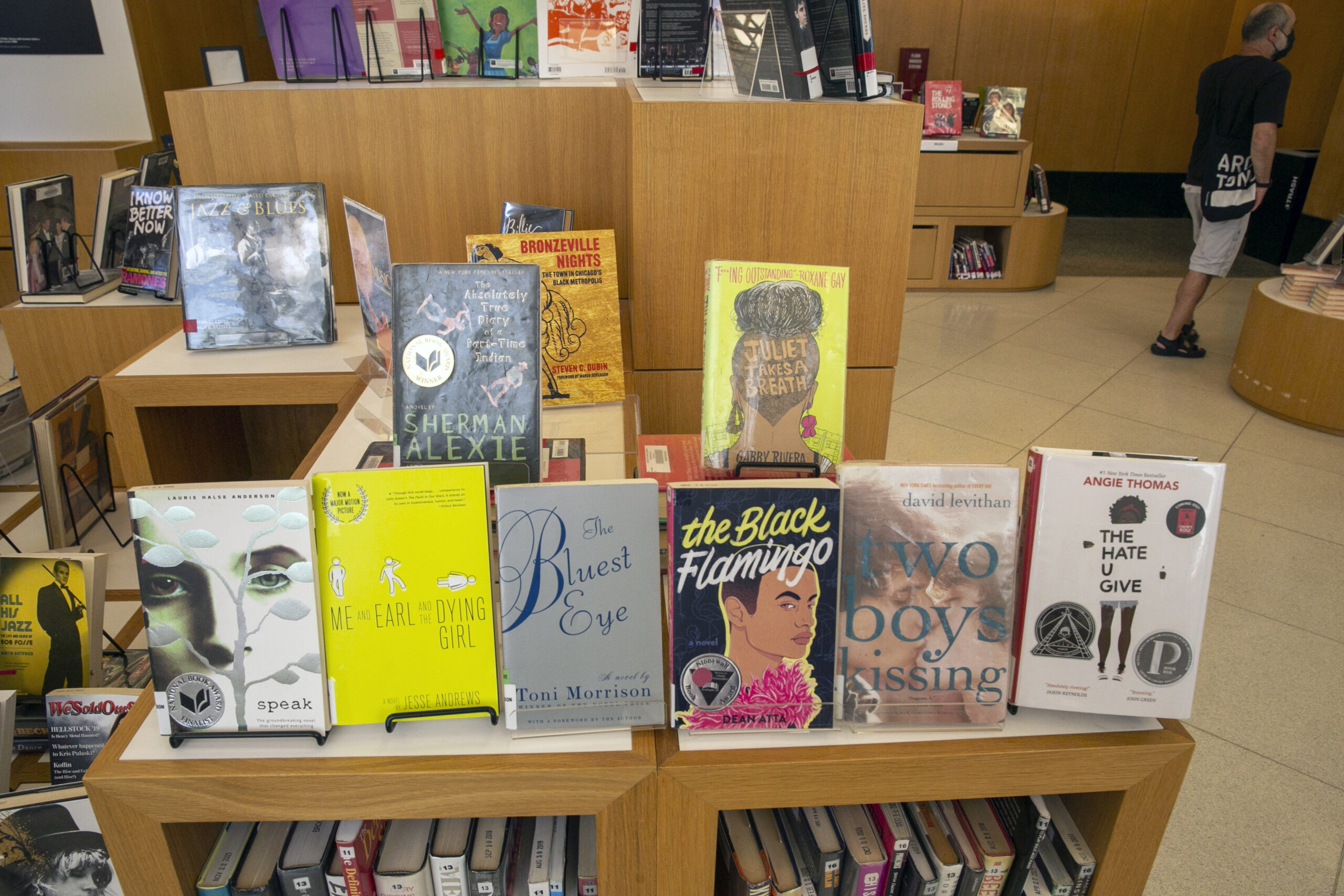Milwaukee religious leaders representing Jewish, Muslim, Buddhist, Roman Catholic and Unitarian congregations gathered Thursday to denounce the rise of Christian nationalism and its threat to democracy.
About 75 clergy from the Milwaukee Inner City Congregations Allied for Hope, or MICAH, launched the “We All Belong” campaign with a rally and march. The event kicked off what will be a series of public gatherings leading up to the 2024 election to bring awareness to Christian nationalism, a once fringe point of view that is growing in acceptance.
Christian nationalism is the belief that America should be defined by Christianity, and that the government should take active steps to keep it that way.
News with a little more humanity
WPR’s “Wisconsin Today” newsletter keeps you connected to the state you love without feeling overwhelmed. No paywall. No agenda. No corporate filter.
A survey conducted in February by the Public Religion Research Institute and the Brookings Institution found that more than half of Republicans believe the country should adhere to the ideals of Christian nationalism or sympathize with those views. That same survey found 15 percent of Democrats hold those beliefs.
While it remains a minority opinion nationwide, the study also found correlations between people who hold Christian nationalist views and anti-Black, anti-immigrant, anti-Semitic, anti-Muslim and patriarchal views.
“We cannot allow Christian nationalism to succeed in its efforts to privilege extremist versions of Christianity above other faiths in clear violation of the separation of church and state,” said Janan Najeeb, chair of MICAH Religious Leaders Caucus and president of Milwaukee Muslim Women’s Coalition. “We want democracy not theocracy.”
The Rev. Dr. Dennis Jacobsen, one of the founding members of MICAH and a longtime Lutheran pastor, said the organization has been working on social justice issues for more than 30 years.
He called Jan. 6 a “punch in the gut” to democracy and said since then, the growth of Christian nationalism has continued to be a threat.
“We can’t really function with integrity unless we challenge this threat to democracy and the freedom of religion in our country,” Jacobsen said. “I’ve seen a real disturbing seduction, I think, of mostly well-intentioned Christians and, from my point of view, power-grabbing preachers and really cynical politicians for their own gain. That really is very dangerous to democracy.”
Jacobsen said he has worked in central-city Milwaukee churches with like-minded parishioners. But he said many of the clergy who attended Thursday’s event have divided congregations.
“I particularly respect those participating today who could be challenged hard at home,” Jacobsen said.
Several parishioners attended the rally, including Tracey McNeely, who brought her 102-year-old mother, Ruth McNeely-Wells.
“She’s the reason I’m an activist. She had me going to rallies as young as 5. Advocacy is in my blood, and it’s because of her,” McNeely said of her mother. “They’re trying to take away our democracy and our freedom to practice religion. They only have one point of view — against LGBTQ people, minorities, and against people of different religions, and that’s not right.”
Rabbi Bonnie Margulis, executive director of Wisconsin Faith Voices for Justice, was at the Watertown “Pride in the Park” event on Saturday when a dozen men dressed in black tops and khaki pants brandishing semi-automatic rifles and waving flags with swastikas showed up.
“We have to counter messages of faith with messages of love,” Margulis said, adding that at her own temple — Beth El in Madison, where her husband is a Rabbi — police attend events to keep the congregation safe.
Margulis said she feels hopeful at events like the one on Thursday because they are examples of religious tolerance.
“We are all human beings,” Margulis said. “We are all endowed with basic human worth and dignity, and that we all need to stand together, again, to counter those messages of hate with messages of love.”
The Rev. Paul Erickson, bishop of the Greater Synod of the Evangelical Lutheran Church of America, encouraged people to have political discussions in their churches.
“Politics is not a four-letter word. We have to get over that and talk about how politics is killing our sisters and brothers,” Erickson said. “This is not a philosophical, theoretical exercise, this has real-life impact. And if you want to say on Sunday morning you love your neighbor, you damn well better act like it on Tuesday morning.”
Wisconsin Public Radio, © Copyright 2026, Board of Regents of the University of Wisconsin System and Wisconsin Educational Communications Board.



